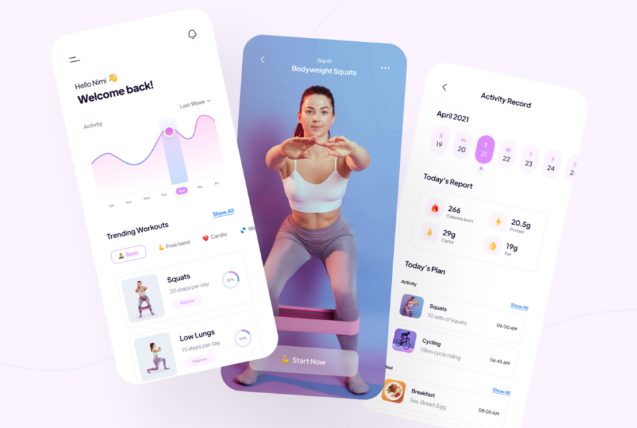Unveiling the Fitness App Market: Transforming Workouts with Technology
In today's fast-paced world, where wellness is a priority, fitness apps have emerged as indispensable tools for individuals seeking to achieve their health and fitness goals. The Fitness App Market is witnessing a remarkable surge, driven by the convergence of technology and fitness, rising health consciousness, and the convenience offered by mobile applications. This article provides an in-depth analysis of the market overview, key segments, recent industry news, prominent companies, drivers fueling market growth, and regional insights of the Fitness App Market. The Fitness apps market industry is projected to grow from USD 28.3716 billion in 2022 to USD 157.9791617 billion by 2030
Market Overview:
The Fitness App Market encompasses a diverse range of mobile applications designed to cater to various aspects of fitness, including workout tracking, nutrition monitoring, meditation, and mental wellness. These apps leverage cutting-edge technologies such as artificial intelligence, augmented reality, and wearable integration to deliver personalized experiences and empower users to lead healthier lifestyles. With the proliferation of smartphones and increasing digitalization, the adoption of fitness apps continues to soar, driving market expansion.
Request To Free Sample of This Strategic Report - https://www.marketresearchfuture.com/sample_request/1405
Key Market Segments:
- Workout Tracking Apps: These apps enable users to track their exercise routines, set goals, monitor progress, and receive personalized recommendations based on their fitness level and preferences.
- Nutrition and Diet Apps: Nutrition apps help users plan balanced meals, track calorie intake, set dietary goals, and access nutritional information to make informed choices about their diet.
- Meditation and Mindfulness Apps: With a focus on mental wellness, these apps offer guided meditation sessions, breathing exercises, stress-relief techniques, and sleep tracking features to promote relaxation and emotional well-being.
- Wearable Integration Apps: Fitness apps integrated with wearable devices such as smartwatches and fitness trackers enable seamless data synchronization, real-time monitoring, and enhanced workout insights.
Industry Latest News:
- Recent market reports indicate robust growth projections for the Fitness App Market, with estimates suggesting a compound annual growth rate (CAGR) exceeding 20% over the forecast period.
- Leading fitness app developers are investing in innovative features such as AI-driven workout recommendations, virtual coaching, gamification elements, and social networking functionalities to enhance user engagement and retention.
- The COVID-19 pandemic has accelerated the adoption of fitness apps as individuals increasingly turn to digital solutions for home workouts, remote coaching, and virtual fitness classes amidst gym closures and social distancing measures.
- Strategic partnerships between fitness app developers and health and wellness brands are on the rise, facilitating the integration of complementary services such as online coaching, nutrition counseling, and e-commerce platforms within fitness app ecosystems.
Key Companies:
- Peloton: Renowned for its immersive home fitness experience, Peloton offers a comprehensive platform combining connected fitness equipment, on-demand workouts, live classes, and a vibrant online community.
- MyFitnessPal: Acquired by Under Armour, MyFitnessPal is a popular nutrition and fitness tracking app that helps users monitor their food intake, track macros, set goals, and access a vast database of recipes and meal plans.
- Nike Training Club: Nike's training app offers a diverse collection of workouts curated by world-class trainers, personalized training plans, progress tracking, and integration with Nike's performance apparel and footwear ecosystem.
- Calm: With a focus on mindfulness and meditation, Calm is a leading app offering guided meditation sessions, sleep stories, breathing exercises, and relaxation techniques to promote mental well-being and stress relief.
- Strava: Known as the social network for athletes, Strava enables users to track their activities, compete with friends, join challenges, discover new routes, and share their fitness achievements seamlessly.
Market Drivers:
- Increasing Health Consciousness: Growing awareness about the importance of physical and mental well-being is driving individuals to seek accessible and convenient solutions for fitness and wellness management.
- Convenience and Accessibility: Fitness apps offer unparalleled convenience by eliminating the constraints of time and location, allowing users to work out anytime, anywhere, and personalize their fitness journey according to their preferences.
- Technological Advancements: Advancements in mobile technology, wearables, and artificial intelligence are enabling fitness apps to deliver more personalized, immersive, and effective experiences to users.
- Remote Fitness Solutions: The shift towards remote work and virtual experiences due to the COVID-19 pandemic has accelerated the demand for digital fitness solutions, driving the adoption of fitness apps for home workouts, virtual coaching, and online community engagement.
- Social Networking and Community Building: Fitness apps with social networking features foster a sense of community, accountability, and motivation among users, driving engagement and retention.
Ask for Customization - https://www.marketresearchfuture.com/ask_for_customize/1405
Regional Insights:
- North America: The North American region dominates the Fitness App Market, fueled by a tech-savvy population, high smartphone penetration, and a strong culture of fitness and wellness.
- Europe: Europe is witnessing significant growth in fitness app adoption, driven by increasing health awareness, rising obesity rates, and a growing emphasis on preventive healthcare.
- Asia-Pacific: The Asia-Pacific region is emerging as a lucrative market for fitness apps, propelled by rapid urbanization, changing lifestyles, and a burgeoning middle-class population with disposable income.
In conclusion, the Fitness App Market is poised for continued growth and innovation, driven by the convergence of technology and fitness, rising health consciousness, and the shift towards digital wellness solutions. As individuals prioritize their health and well-being, fitness apps will play an increasingly integral role in empowering users to lead healthier, more active lifestyles. With ongoing advancements in technology and user-centric design, fitness apps will continue to evolve, offering personalized experiences that inspire and motivate individuals on their fitness journey.
Fitness App Market Highlights:



